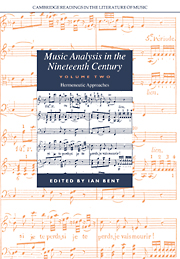Book contents
- Front matter
- Contents
- Preface to volumes I and II
- List of abbreviations
- General introduction
- Part I: Elucidatory analysis
- Introduction
- Analysis 1 Hector Berlioz (1803–1869)
- Analysis 2 Richard Wagner (1813–1883)
- Analysis 3 Wilhelm von Lenz (1809–1883)
- Analysis 4 Ernst von Elterlein [Ernst Gottschald] (1826-?)
- Analysis 5 Julius August Philipp Spitta (1841–1894)
- Analysis 6 Hans von Wolzogen (1848–1938)
- Analysis 7 Hermann Kretzschmar (1848–1924)
- Part II: Objective–subjective analysis: the hermeneutic circle
- Afterword to volumes I and II
- Bibliographical essay
- Index to Volumes I and II
Analysis 2 - Richard Wagner (1813–1883)
‘Bericht über die Aufführung der neunten Symphonie von Beethoven … nebst Programm dazu’ (1846)
Published online by Cambridge University Press: 10 December 2009
- Front matter
- Contents
- Preface to volumes I and II
- List of abbreviations
- General introduction
- Part I: Elucidatory analysis
- Introduction
- Analysis 1 Hector Berlioz (1803–1869)
- Analysis 2 Richard Wagner (1813–1883)
- Analysis 3 Wilhelm von Lenz (1809–1883)
- Analysis 4 Ernst von Elterlein [Ernst Gottschald] (1826-?)
- Analysis 5 Julius August Philipp Spitta (1841–1894)
- Analysis 6 Hans von Wolzogen (1848–1938)
- Analysis 7 Hermann Kretzschmar (1848–1924)
- Part II: Objective–subjective analysis: the hermeneutic circle
- Afterword to volumes I and II
- Bibliographical essay
- Index to Volumes I and II
Summary
Wagner wrote some fourteen ‘programmatic elucidations’ of pieces of music. The majority of these were produced within a three-year period, 1852–4, during his exile in Zurich. Of them, the longest are the essays on Beethoven's ‘Eroica’ Symphony and Coriolan Overture, the shortest is that on the C# minor String Quartet Op. 131, the emotional spectrum of which is expressed in a thumbnail sketch thus: ‘from the melancholic morning orisons of an oppressed soul, past visions of the charming, the winsome and the ravishing; through feelings of bliss, ecstasy, yearning, love and devotion; at last to mercurial merriment, droll delight and finally rueful resignation at the bounties of the world’.
At that time, Wagner provided similar programmes for concert performances of excerpts from The Flying Dutchman, Tannhäuser and Lohengrin, Later, in 1859 and 1863, he did likewise for excerpts from Tristan and Isolde, in 1864 for excerpts from The Mastersingers of Nuremberg and The Valkyrie, in 1875 for excerpts from The Twilight of the Gods and in 1882 Parsifal.
Most of these are written in a high-flown style that is half-prose, half-poetry. They are a literary genre in themselves, located somewhere on the spectrum between his theoretical writings and his texts for the later dramas (not to mention the fictional novella A Pilgrimage to Beethoven, written in 18405). Throughout them, vestiges of the alliterative verse that Wagner was developing so intensely around 1850, which he used with especial power in Tristan and the Ring, keep surfacing.
- Type
- Chapter
- Information
- Music Analysis in the Nineteenth Century , pp. 58 - 68Publisher: Cambridge University PressPrint publication year: 1994

